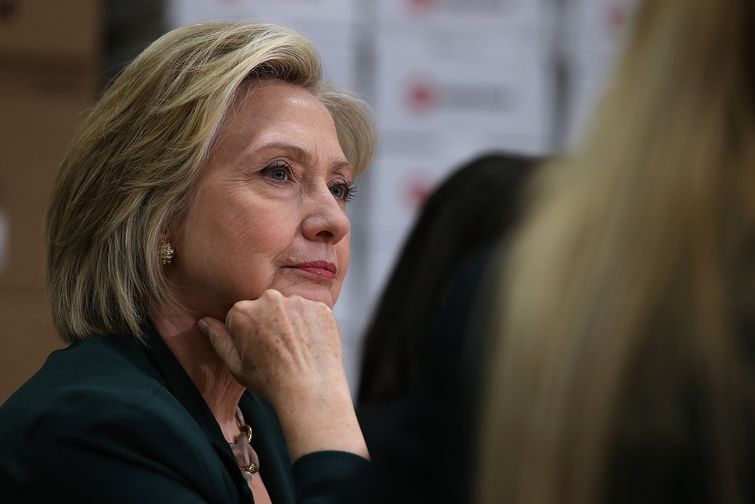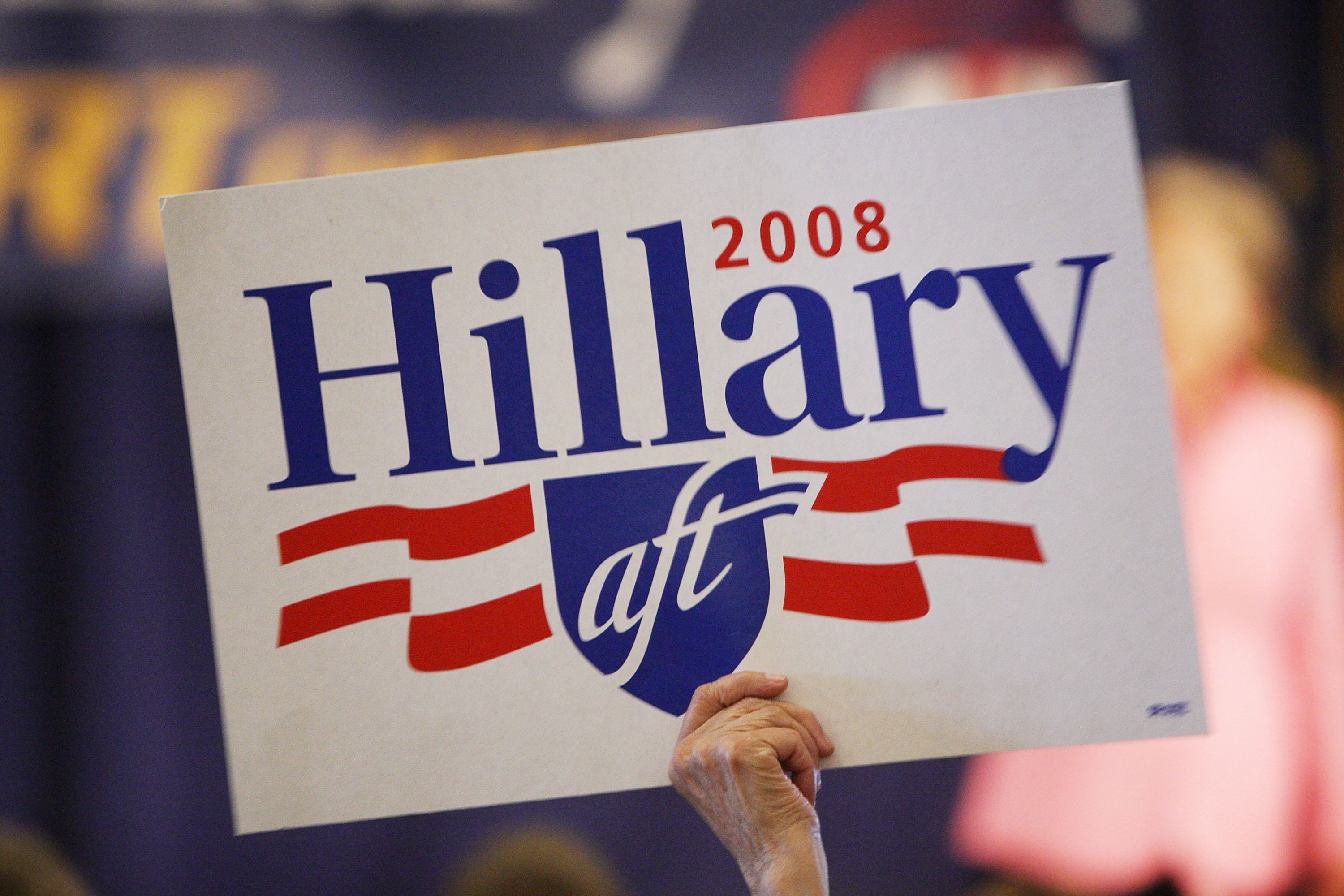Who's most excited for Hillary Clinton to replace Obama? Teachers unions.

Hillary Clinton is unlikely to offer a meaningfully different domestic policy agenda than Barack Obama. But if you're looking for an exception to the rule, look at K-12 education.
Obama has picked fights with teachers unions by promoting the Common Core, charter schools, and merit pay for teachers. Clinton has a better relationship with unions who either oppose those policies or are concerned about how they're being implemented.
"I think she’s going to be different," said Randi Weingarten, president of the American Federation of Teachers union. "It doesn’t mean she’s going to agree or disagree." But she suggested Clinton's point of view on some issues might align more closely with her own: "What we’ve learned about her in all these years is she understands teachers are really important to kids."
So while Clinton will lay out themes and messages that sound a lot like Obama's on many issues, there is room for substantive difference on education. A Clinton presidency could mean a significant shift in policy away from the Obama administration's aggressive reforms.
How the Obama administration embraced education reform and alienated unions
For the past seven years, Education Secretary Arne Duncan has wielded more power than his predecessors — and he's used it to promote policies opposed by teachers unions.
The most controversial among them requires states to evaluate teachers based in part on their students' test scores. If states wanted their schools to escape penalties under No Child Left Behind, the federal education law that required all students to be proficient in reading and math in 2014, the Education Department required them to overhaul teacher evaluation.
When the Obama administration took office, only three states used students' test scores as a factor in their evaluation systems. Now more than 40 have designed systems to do so. Those systems usually rely on value-added scores, which try to estimate the impact of an individual teacher on the progress students make during an academic year, as well as classroom observations and other factors.
Economic research has found that the students of teachers with higher value-added scores are more likely to attend college and earn higher salaries later in life. But teachers unions arguethat value-added systems are at best too narrow in their definition of good teaching, and at worst fatally flawed. The new systems have led some states to create assessments for less academic subjects like art and gym. And a study of value-added scores found they're only weakly linked to teachers' performance in the classroom.
This isn't the only reason for the rift between Obama and teachers unions. The Education Department has encouraged states to make it easier to open charter schools, schools that are publicly funded but privately run and that are typically not unionized. And Duncan praised the verdict in a California lawsuit that overturned teacher tenure in the state.
The Obama administration's education agenda is controversial even within the Democratic party — and it's in force not due to legislation, but due to how Obama and Duncan have wielded executive power. They've pushed states to make changes with competitive grants and waivers from No Child Left Behind. The lack of underlying legislation makes Obama's education agenda particularly vulnerable to the whims of the next administration, Democratic or Republican.
Clinton has historically been closer to unions

At least for now, Clinton has preserved traditional Democratic ties with unions — a contrast with Obama that was most obvious in a small dispute in the 2008 Democratic primary over merit pay.
Obama supported merit pay for individual teachers. Clinton wanted entire schools to be rewarded, arguing that merit pay for individual teachers was "demeaning" and would lead to unhealthy competition between educators. She eventually won the AFT's endorsement. (The NEA, the other major teachers union, sat out the primary endorsement process before endorsing Obama in the general election.)
"She’s passionate about children, and she’ll follow the evidence, and she’ll talk to people and give people their due, instead of thinking about things ideologically, as you’ve seen in the last 10 years," Weingarten said.
But where Clinton will be in 2016 is difficult to predict. She is best known for her support of early childhood education, a priority for Obama and Duncan that could become a focus of the next Democratic administration. She hasn't dealt with the more contentious world of K-12 policy since leaving the Senate.
The Clinton campaign did not respond to an email asking about her education plans. At a roundtable conversation in Iowa on Monday, Clinton focused on education and its role in the economy and said the "really unfortunate argument that's been going on around Common Core" has been "really painful."
But there are early signs that she might work with unions. The Center for American Progress, a think tank now closely allied with Clinton, worked with the American Federation of Teachers onrecommendations for overhauling No Child Left Behind. They recommended testing students every year, as under current law. But states would only be required to include one test from elementary school, one from middle school, and one from high school in their systems for evaluating schools, rather than using annual test results.
Education reformers criticized the joint AFT-CAP approach as being less stringent on accountability. The framework suggests that after the Obama administration, Democrats and teachers unions might align more closely on policy than they have in the past six years.
A board member of Democrats for Education Reform told the New York Times's Maggie Haberman in March that he was concerned about Clinton's "longstanding ties" with unions. The group said in a statement Sunday that it celebrated her candidacy and is "hopeful that she … carries on President Obama's legacy of promoting quality teachers and benchmarks that give every student a chance to succeed no matter their background."
Why the Obama administration's brand of reform might not survive
Clinton wouldn't have to pursue more union-friendly policies in order to break with the past. She'd simply have to abandon some of the more controversial parts of the Obama administration's approach.
It's possible that she won't even get the option: a compromise draft for overhauling No Child Left Behind proposed by Democratic Sen. Patty Murray and Republican Sen. Lamar Alexander would tie the Education Department's hands, cutting back on the amount of influence the secretary could exert over state policy. If that bill becomes law, it would significantly limit how much influence Clinton could have on K-12 education.
The waivers from No Child Left Behind's penalties have been a powerful inducement for states to do what the administration wants. But they have also created a complicated interplay between states and the federal government, where states are constantly monitored to see if they're living up to their side of the deal.
If No Child Left Behind limps on into a Clinton administration, when it would be a decade late for an overhaul, the next Education Department could simply create waivers with fewer conditions.
Stepping back slightly from reform wouldn't require a broad array of new policy proposals. It would just require doing slightly less.


